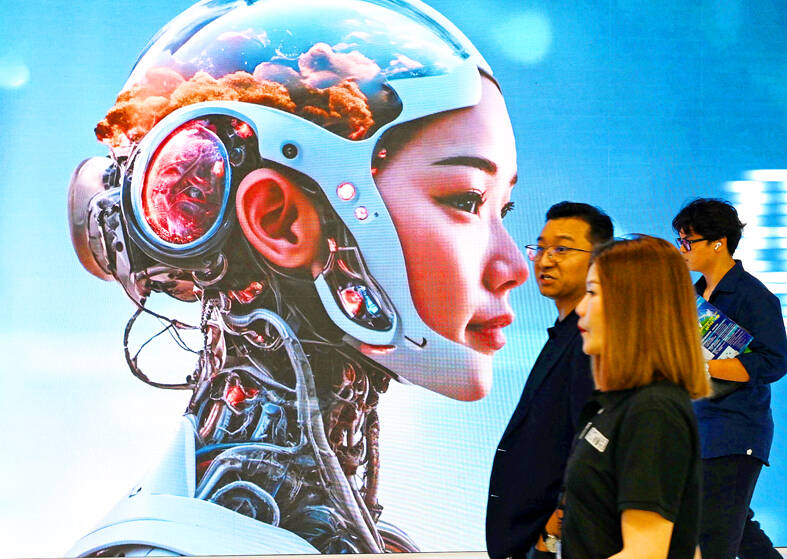A list of key technologies is to be expanded to include artificial intelligence (AI) chip design and nine other items, the National Science and Technology Council (NSTC) said yesterday.
To protect Taiwan’s crucial technologies in line with global industrial trends and domestic demand, the Executive Yuan on Dec. 5 last year announced a list of 22 key technologies, ranging from national defense and cybersecurity to aerospace, agriculture and semiconductors.
The list aims to prevent secret information about the technologies being leaked to foreign countries, which could put the nation’s security and the competitiveness of local industries at risk, the council said at the time, adding that the list would be reviewed periodically to prevent technology leaks to China, including Hong Kong and Macau, or foreign hostile forces, from undermining the nation’s security, industrial competitiveness and economic development.

Photo: Chang Chia-ming, Taipei Times
To ensure national security and maintain an industrial competitive edge in response to changes in international regulations, the NSTC yesterday published a preview of set of 10 technologies that it has proposed be added to the list.
The preview is available on its Web site for public feedback and suggestions for 14 days, it said.
The additions were decided based on local and international levels of technology protection, and the status of industrial development in Taiwan, encompassing fields from aerospace and quantum technologies to semiconductors and energy, the agency said.
Technologies such as the design of high-performance computing AI chip and launch systems, including the design and manufacture of small satellite launch systems, were added to bolster the defense of trade secrets for the nation’s core technologies, the NSTC said.
The updated list would help prevent infringements on national and industrial interests, it added.
The NSTC said it would continue to garner expert opinions from a range of fields on the proposed additions and discuss the opinions with authorities until Nov. 15.
A review conference would be convened by the end of the year to approve the 10 new technologies, with the final decision sent to the Executive Yuan for announcement, it said.

POSITIVE DEVELOPMENT: Japan and the US are expected to hold in-depth discussions on Taiwan-related issues during the meeting next month, Japanese sources said The holding of a Japan-US leaders’ meeting ahead of US President Donald Trump’s visit to China is positive news for Taiwan, former Japan-Taiwan Exchange Association representative Hiroyasu Izumi said yesterday. After the Liberal Democratic Party’s landslide victory in Japan’s House of Representatives election, Japanese Prime Minister Sanae Takaichi is scheduled to visit the US next month, where she is to meet with Trump ahead of the US president’s planned visit to China from March 31 to April 2 for a meeting with Chinese President Xi Jinping (習近平). Japan and the US are expected to hold in-depth discussions on Taiwan-related issues during the

‘LIKE-MINDED PARTNER’: Tako van Popta said it would be inappropriate to delay signing the deal with Taiwan because of China, adding he would promote the issue Canadian senators have stressed Taiwan’s importance for international trade and expressed enthusiasm for ensuring the Taiwan-Canada trade cooperation framework agreement is implemented this year. Representative to Canada Harry Tseng (曾厚仁) in an interview with the Central News Agency (CNA) said he was increasingly uneasy about Ottawa’s delays in signing the agreement, especially as Ottawa has warmed toward Beijing. There are “no negotiations left. Not only [is it] initialed, we have three versions of the text ready: English, French and Mandarin,” Tseng said. “That tells you how close we are to the final signature.” Tseng said that he hoped Canadian Prime Minister Mark Carney

President William Lai (賴清德) yesterday bestowed one of Taiwan’s highest honors on Saint Vincent and the Grenadines (SVG) Ambassador Andrea Clare Bowman in recognition of her contributions to bilateral ties. “By conferring the Order of Brilliant Star with Grand Cordon on Ambassador Bowman today, I want to sincerely thank her, on behalf of the Taiwanese people, for her outstanding contribution to deepening diplomatic ties between Taiwan and SVG,” Lai said at a ceremony held at the Presidential Office in Taipei. He noted that Bowman became SVG’s first ambassador to Taiwan in 2019 and

A man walks past elementary school artworks at the Taipei Lantern Festival in Ximen District yesterday, the first day of the event. The festival is to run from 5pm to 10pm through March 15.